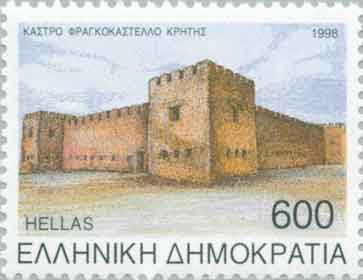|
, Crete. Because he had some education, his compatriots called him 'Daskalos' (teacher), hence Daskalos plus Ioannis = Daskalogiannis. He is referred to as a town clerk and chairman of the country of Sfakiá as early as 1750. As a member of the Filiki Eteria, he agreed to fund and organise a rebellion in Sfakiá against the Turkish authorities when Russian agents agreed to back him. The Russian support never arrived, as it appears that they merely wished to distract the Turks from their attacks elsewhere around the Ottoman Empire. The rebellions across Greece were known as 'Orlofika', as they had been promoted by Count Orlov. For a short time, parts of Crete had the attributes of an independent nation, including its own coins, minted in a cave near Hora Sfakion. The revolt started in early 1770, with the flag raised at the church of Agios Georgios, Anopolis but was put down early the following year by 40,000 Turkish troops against 1,300 rebels. Sfakiá was for the first time fully dominated by Turkish forces. Daskalogiannis surrendered with 70 men at the castle of Frangokastello near Hora Sfakion. He was however, on the orders of the Pasha of Handax (Heraklion), captured, tortured outside Heraklion's harbour fortress, skinned alive and executed in June 1771. He is said to have suffered all this in dignified silence. Daskalogiannis was immortalised in a celebrated epic ballad by Barba-Pantzelios, a poor cheese-maker from Mouri - To tragoudi tou Daskalogianni of 1786: …Φτάνουν στο Φραγκοκάστελο και στον πασά ποσώνου, ...They arrive at Frankokastello and surrender to the pasha, Many folk tales and songs inspired a hundred years of revolt against the Ottoman Empire. The international airport of Chania (CHQ) is named Daskalogiannis. A memorial can be found in his birthplace, Anopolis. Retrieved from "http://en.wikipedia.org/"
 |
|
|||||||||||||||
